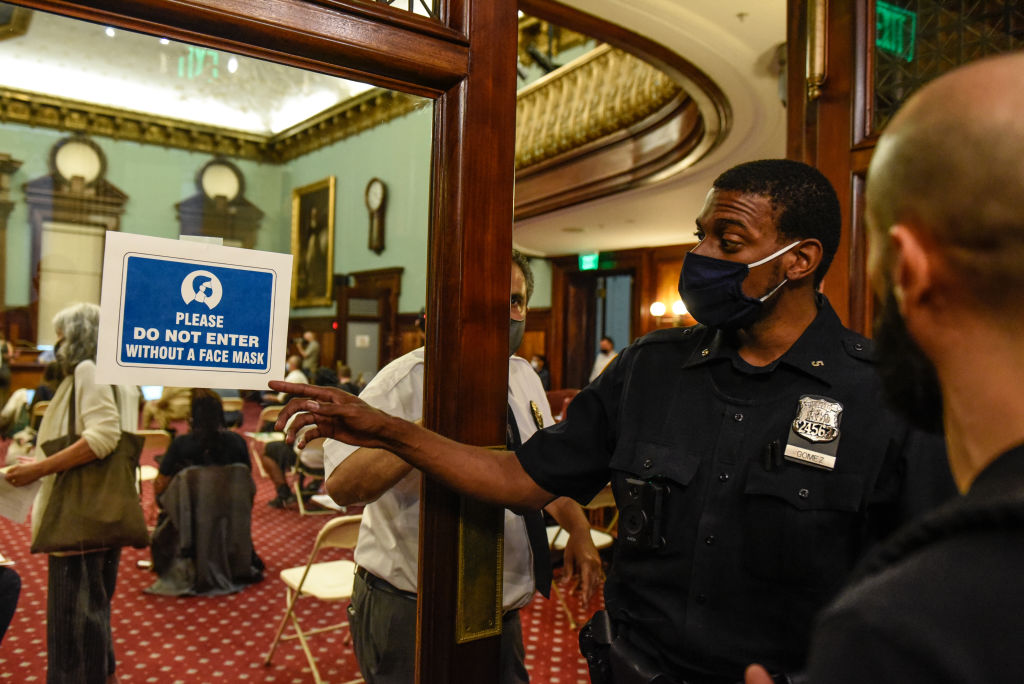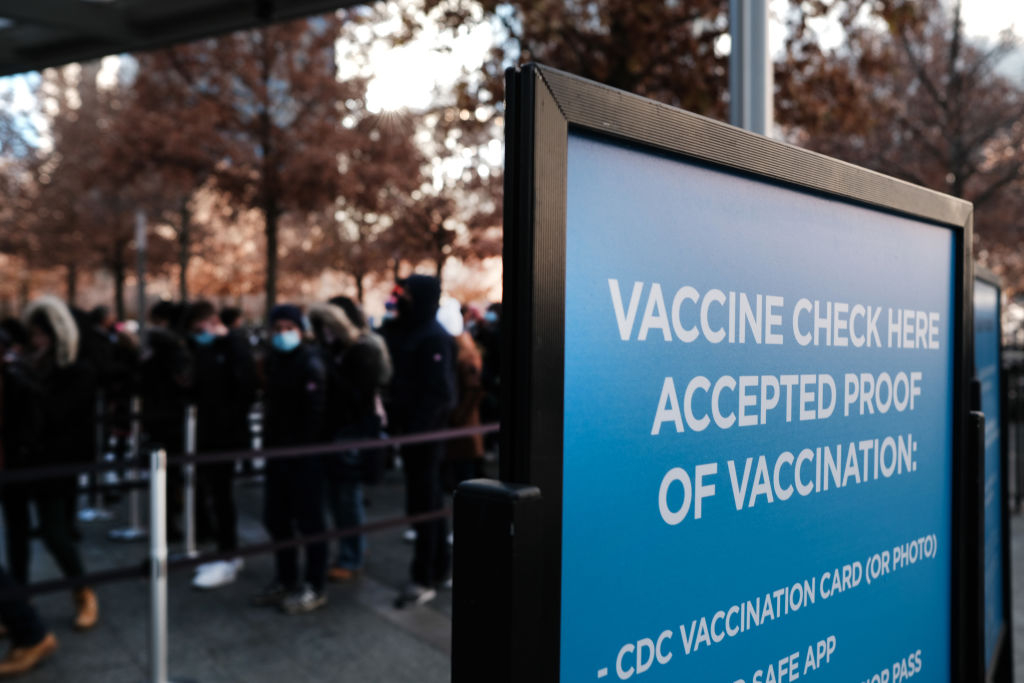What to Know
- Gov. Kathy Hochul says stricter measures are needed to curb COVID spread across the state; delta has driven hospitalizations to months-long highs while omicron may be fueling the latest case surge
- COVID hospitalizations have topped 3,600 for the first time since April 20 and are up 92% in the last month alone; daily deaths surpassed 60 Sunday for the first time in well more than half a year
- While the severe cases are linked to the delta variant, omicron could be fueling increases in infections; daily NY case totals are at early February numbers and the pace of vaccinations isn't keeping up
Live or work in New York? If you head inside any space that's not your home and doesn't require full vaccination proof, you must wear a mask, according to an order the governor issued last week in a preemptive attack on the latest COVID wave.
Not all local governments, which are tasked with enforcing the new mandate, appear inclined to play ball, including at least two Republican county executives and an incoming GOP leader who will serve a county bordering New York City.
Facing a cold-weather surge in COVID-19 infections, Gov. Kathy Hochul implemented the new rules because of the rising number of cases and hospitalizations, which have been especially pronounced in some upstate areas.
The order took effect Monday, with fines up to $1,000 per violation. Here are three key things businesses, employees and the public should know about it right now.
New York enacted a mask mandate early in the pandemic that ended in June 2021 for vaccinated individuals. The new mask mandate applies to customers and staff and will be in effect through Jan. 15, after which the state will reevaluate. Here's what else you need to know about it, whether you're a patron, employee or owner.
Get Tri-state area news delivered to your inbox. Sign up for NBC New York's News Headlines newsletter.
The latest implementation -- with that proof-of-vaccination tweak -- comes as state COVID hospitalizations have topped 3,600 for the first time since April 20. Virus admissions are up 92% in the last month alone, and daily deaths topped 60 Sunday for the first time in well more than half a year but dropped to the mid-40s Monday.
Mask use is linked to a roughly 70% reduced risk of COVID infection, the state says -- and the governor insists now is the time to start maximizing tools to reduce risk.
"As governor, my top priority is to protect the health of New Yorkers and the health of our economy, and these temporary measures will help us get through the holiday season safely," Hochul said in a statement Monday.
"I share everyone's frustration that we have gotten to this point, especially with the vaccine at our disposal," she added. "I want to thank the millions of New Yorkers who have done the right thing to get fully vaccinated. We are all in this together and if others will follow suit, these measures will no longer be necessary."
Hochul says her mandate was spurred in part by soaring COVID rates in areas with low vaccination rates. Statewide, the seven-day average case rate has increased by 43% and hospitalizations have increased by 29% since Thanksgiving. The pace of vaccinations continues to rise, but the 2% increase from Thanksgiving to the data Hochul announced the mandate is hardly enough to keep pace with viral spread.
Even in cases where vaccination rates are higher, COVID's recent spread, whether omicron-induced or otherwise, is far outpacing them.
More Coverage
While more data is needed to determine whether omicron is linked to more severe outcomes or reduced vaccine efficacy, experts say it certainly appears to be more infectious than earlier strains, possibly even more infectious than delta.
The CDC said last week that of the 40-plus U.S. people who have been found to be infected with omicron so far, more than 75% of them were vaccinated. Breakthrough infections have been rising in New York since early November, though still account for a fraction of new infections compared with the non-vaccinated.
New York joins several states that have reimposed similar indoor mask mandates, including Washington, Oregon, Illinois, New Mexico, Nevada and Hawaii. Parts of the country are grappling with their worst crises of the pandemic so far.
On Monday, America passed another grim milestone -- 800,000 COVID deaths in less than two years. Still, mask mandates have become a hot-button issue.
For weeks, Hochul has said local governments would decide on their own whether to reimpose COVID-19 protocols. She has also cautioned she may have to take harsher action, as she did last week, to stem the tide. The Democrat feels communities that haven't followed COVID protocols before likely won't now either. She is focusing her efforts on curbing the latest surge where she can -- and encouraging, if not outright mandating, that local municipalities do the same.
Some fellow Democrats cheered Hochul's mask announcement, as did a large union representing retail and grocery workers, while Republicans called it an overreach and an unnecessary burden on businesses.
Local health departments are in charge of enforcement. Already, Republican Rockland County Executive Ed Day said the governor’s staff didn't provide sufficient information about the new requirement -- and he said Rockland County wouldn't enforce the order.
“I told the governor’s staff that we cannot and will not enforce this requirement as it currently stands,” Day said in a statement.
Dutchess County Executive Marcus Molinaro has said he won't enforce the mandating, citing what he describes as a lack of supporting data. Incoming Nassau County Executive Bruce Blakeman has indicated he's not on board either.
Read the full text of the new state mask mandate right here.
New York City Mayor Bill de Blasio, who currently requires proof of vaccination for anyone older than 12 going indoors at restaurants and entertainment and fitness venues, applauded Hochul's step last week. He was vaguer when asked Monday about enforcement plans, telling reporters at his COVID briefing that the city was working in partnership with the state to help execute and enforce the mandate.
"What we've done historically has worked, which is a heavy focus on education and problem-solving. We don't want to penalize people unless there is overt resistance and unwillingness to cooperate, which is very, very rare," de Blasio explained.
Overall, he said the mandate is the right thing to do -- and doubled down on his own expansion of vaccine requirements for kids aged 5 to 11 that takes effect Tuesday.
"You're seeing the trend lines with cases going up, hospitalizations going up, so we need to attack on all fronts," de Blasio said. "We're doing a preemptive strike, putting extremely strong measures in place to stop us from ending up where we did in 2020 with shutdowns and restrictions. We can see the handwriting on the wall."
"There are too many places shutting down because they didn't put the strongest possible measures in place. We made a decision early on to go father ... and do pure vaccination mandates and they have worked. It all goes together," the mayor added. "To me, the issue is where we see COVID going and how we have to get there ahead of it. That dictates what we're doing."
Later this month, on Dec. 27, de Blasio's strictest-in-the-nation vaccine mandate takes effect. That requires proof of two vaccine doses for the entire private sector. The city workforce is already subject to de Blasio's proof-of-one dose mandate and will also have to start showing proof of two doses in two weeks.
The mayor insists vaccine mandates work. Nearly 95% of the municipal workforce is at least partially vaccinated, while 90% of NYC adults have at least one dose.
They'll need to get their second to be in compliance with the mayor's Dec. 27 order. About 82% are fully vaccinated, the latest city data shows.
Businesses have complained they lack the resources to support de Blasio's mandate, especially when it comes to smaller enterprises. More guidance for those businesses is expected from City Hall later this week. The mandate takes effect four days before Mayor-Elect Eric Adams is sworn into office. He has said he'll review the policy with his team and make his own decision on whether to adopt it.
In the city, the rolling weekly COVID case average is up about 34% compared with the average for the prior four weeks, according to Monday's data. More importantly, hospitalizations are up 14% on a rolling average after showing their first signs of rising at the back end of last week. Officials say the increase is reflective of some of the overall case surge but it's been relatively contained for now -- a testament to the ability of the existing vaccines to ward off severe COVID-linked illness and death.



